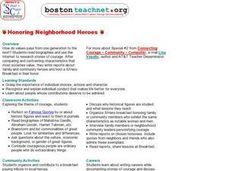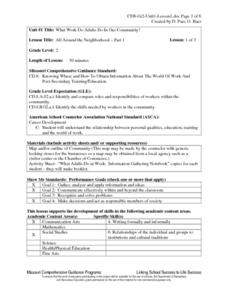Curated OER
Sorting by Site: Missouri quarter reverse
Lewis and Clark took note of the animals common to their home state. As they traveled, they noticed that different places had different types of animals. Your class will use this model to compare and contrast elements that make up their...
Indian Land Tenure Foundation
Leaders' Decisions and Actions
Community leaders try to make choices that protect the community and the environment. Little ones learn about how tribal communities look to their chief to guide the decision-making process. Your class will become part of the community...
Curated OER
What Does It Mean To Be a Good Citizen?
Students study citizenship and what it means to be a good sitizen. They create their own country and determine its citizenship rules. They work together to create a visual representation of what makes a good citizen.
Curated OER
Honoring Neighborhood Heroes
Read biographies and use the internet to research stories of courage.Young writers compare and contrast characteristics that societies value. They write reports about their family and community's heroes.
Curated OER
All Around the Neighborhood
Second graders explore the roles, responsibilities and skills of community leaders as they discuss the definition of community. They brainstorm businesses in the community and explore the importance of each profession represented in the...
Curated OER
Conferences and General Courses Framework for the Law Elective: Mainstreaming Law-Related Opportunities in the Local Curriculum
Students study background information on the laws and customs that make up our legal system, our legislative system, and our executive branches of government.
Curated OER
Voter Fraud: Are Ghosts Going To The Polls
Students research background material about voting in their community. They interview local/county election officials to see what is going on in the community. They also interview teachers, and students to determine if they are newly...
Curated OER
Past and Present
Learners research their community history and choose on aspect to create an iMovie on. They use digital photographs and old images of community place that show how they have changed.
Curated OER
What Does Respect Look Like at Home?
Fourth graders conceptualize the value of respect for self, and give examples and non-examples. They describe how things could have been done differently within the family or the community for non-examples. Students conceptualize the...
Curated OER
The Ongoing Debate: Crime Control v. Due Process Protection
Young scholars investigate the Exclusionary Rule and other ways of to enforce the protections found in the Bill of Rights. They study how effective criminal control and public safety is carried out while citizens Constitutional rights...
Curated OER
Shoplifting
Students demonstrate knowledge that shoplifting is a crime and choose a socially positive course of action.
Curated OER
Entrepreneur
The students, in groups of four, establish a profitable business in the community. They complete research and conduct presentations.
Curated OER
Search and Seizure: What Does It Mean?
Students, in a juvenile correctional facility, study the meaning of the Fourth Constitutional Amendment. They study definitions and complete worksheets to investigate the implications of the amendment.
Curated OER
Presenting Constitutional Issues in a Non-adversarial Mode
Students study the Fourth, Fifth, Sixth, Eighth Amendments to the US Constitution. They apply different points of view to their research and present their finding to the class.
Curated OER
Legal Forms of Business
Have your budding entrepeneurs explore the businesses in their community and determine what legal form each of businesses are. They discuss the rationale for determining a legal form of business and then write a paper that describes a...
Curated OER
A Single Lucid Moment
Students examine a case study of contrasting values between cultures. They read and discuss a story of a family of Peace Corps volunteers in Papua New Guinea, write a response to the story, and write a script for a dramatization of the...
Curated OER
So where CAN I dump the snow?
Students research the ordinance about dumping snow in their community. They interview city officials and the city web site. Students conduct research to find out what other cities like theirs have. They write an informative article about...
Curated OER
Speaking Out Against War
Students research on the Web and in other venues to track the Iraq war protests high school students have joined or even led. Students interview students in your community who have joined protests or expressed their views in other ways...
Curated OER
Leadership
Young scholars list the qualities of a good leader as well as the various roles of group members. They discuss how good leaders help make the group more successful and identify people in their community who are good leaders. Students...
Curated OER
Exploration of Post-Secondary Options
Tenth graders comprehend the relationship of academics to the world of work and to life at home and in the community. They discuss how they are life is going to be different this year? Students listen to Alumni of the school come back...
Curated OER
Entrepreneurship
Give your class a copy of USA TOday to read through and find articles about companies that offer goods or services. They create a graphic organizer and list the business, product, want or need fulfilled of the companies found in the USA...
Curated OER
Audio Media Creation and Exploration
Students research historical people and events in their community and crate audio files that are shared in the form of locative media. In this audio media lesson plan, students give presentations in front of the class.
Curated OER
Back to School (Secondary)
Welcome your class back to school! They will participate in a character education lesson plan in order to build community at the school. First they identify needs of new students by putting themselves in their shoes and create welcome...
Curated OER
COMMUNICATION - LISTENING WORKSHOP 1: Values Awareness
Students in this workshop strive to be reflective listeners as Master Teachers. They focus on communication skills necessary to deal with common family problems and community problems.

























